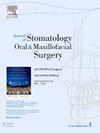头颈部鳞状细胞癌各组织学亚型的预后影响:更新。
IF 1.8
3区 医学
Q2 DENTISTRY, ORAL SURGERY & MEDICINE
Journal of Stomatology Oral and Maxillofacial Surgery
Pub Date : 2024-11-14
DOI:10.1016/j.jormas.2024.102149
引用次数: 0
摘要
背景:头颈部鳞状细胞癌(HNSCC)是全球最常见的恶性肿瘤之一,多发于口腔、口咽、下咽、鼻咽、喉和鼻窦的粘膜上皮。除了以细胞不典型性和鳞状分化程度为特征的传统形态学模式外,HNSCC 还可分为八种组织病理学亚型:基底细胞型、纺锤形细胞型、腺鳞状细胞型、阴沟癌型、疣状细胞型、淋巴上皮型、乳头状细胞型和棘细胞型:本综述全面回顾了有关 HNSCC 组织学亚型预后影响的文献:尽管有关 HNSCC 的文献很多,但很少有研究特别关注其组织病理学亚型的治疗和预后。在这些亚型中,疣状鳞状细胞癌和阴沟癌的预后一般较好,而其他亚型,如基底细胞鳞状细胞癌和纺锤形细胞鳞状细胞癌的临床病程往往更具侵袭性:在这篇综述中,我们深入研究了 HNSCC 的组织病理学亚型,并探讨了它们的临床病理学、分子和预后结果。有必要进一步开展分子研究,以确定针对这些亚型的靶向疗法。此外,考虑到目前预后评估的局限性,认识到文献中记录的新出现的组织病理学变异至关重要。本文章由计算机程序翻译,如有差异,请以英文原文为准。

Prognostic implications across histological subtypes of head and neck squamous cell carcinoma: An update
Background
Head and neck squamous cell carcinoma (HNSCC) is one of the most common malignancies worldwide, arising from the mucosal epithelium of the oral cavity, oropharynx, hypopharynx, nasopharynx, larynx, and sinuses. In addition to the conventional morphologic pattern characterized by the degree of cellular atypia and squamous differentiation, HNSCC is classified into eight histopathologic subtypes: basaloid, spindle cell, adenosquamous, cuniculatum, verrucous, lymphoepithelial, papillary, and acantholytic.
Methods
This review provides a comprehensive review of the literature on the prognostic implications of the histological subtypes of HNSCC.
Results
Although there is extensive literature on HNSCC, few studies specifically focus on the treatment and prognosis of its histopathologic subtypes. Among these subtypes, verrucous squamous cell carcinoma and carcinoma cuniculatum generally have a favorable prognosis, while others, such as basaloid and spindle cell squamous cell carcinoma, tend to follow a more aggressive clinical course.
Conclusion
In this review, we delve into the histopathological subtypes of HNSCC and explore their clinicopathological, molecular, and prognostic findings. Further molecular investigations aimed at identifying targeted therapies for these subtypes are necessary. Moreover, it is crucial to recognize the emerging histopathological variants documented in the literature, considering the ongoing limitations in prognostic assessment.
求助全文
通过发布文献求助,成功后即可免费获取论文全文。
去求助
来源期刊

Journal of Stomatology Oral and Maxillofacial Surgery
Surgery, Dentistry, Oral Surgery and Medicine, Otorhinolaryngology and Facial Plastic Surgery
CiteScore
2.30
自引率
9.10%
发文量
0
审稿时长
23 days
 求助内容:
求助内容: 应助结果提醒方式:
应助结果提醒方式:


